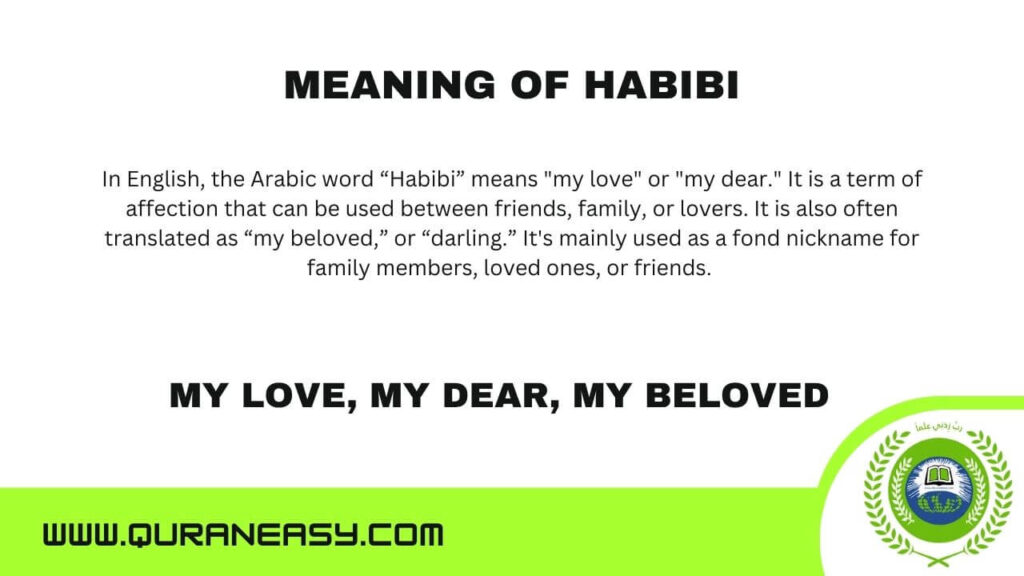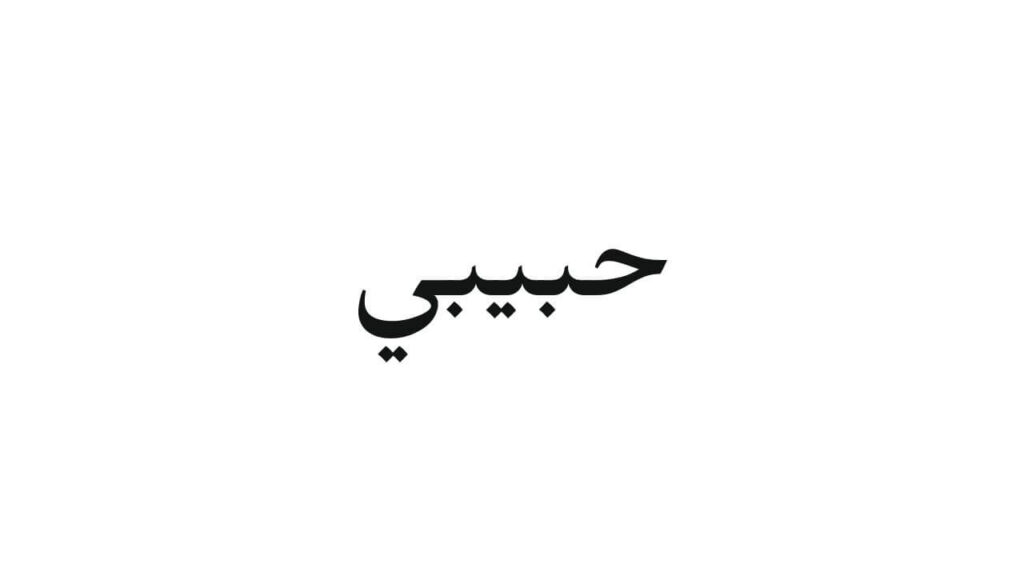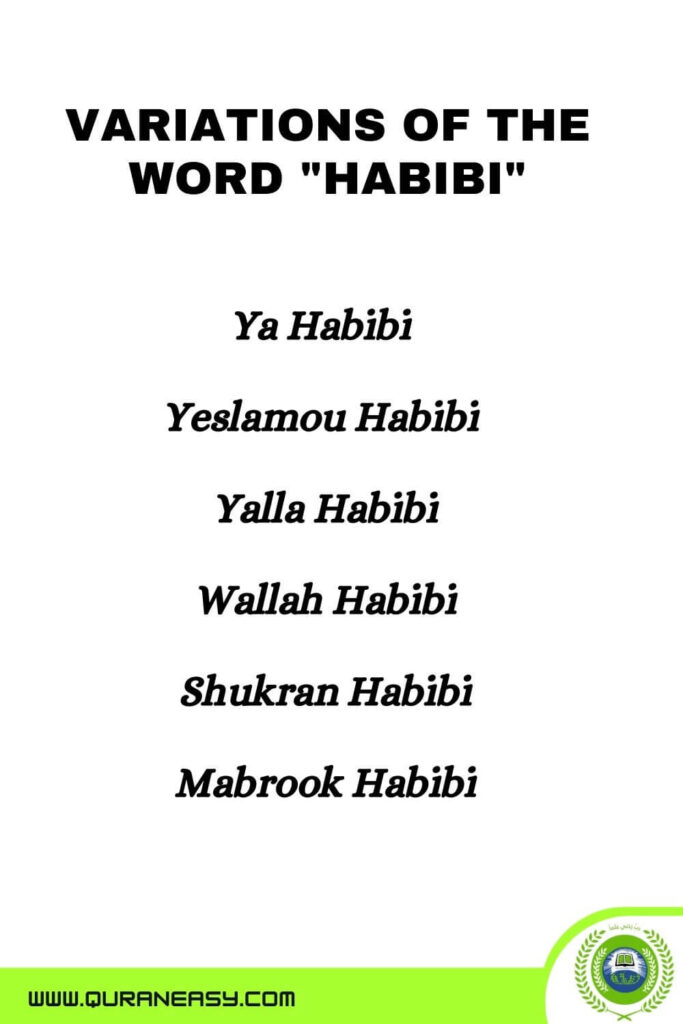“Habibi” is a friendly Arabic word that means “my dear” or “my beloved.” It’s a nice word people use to show care or love towards each other, like family, friends, or someone they admire. When “Habibi” is used with other Arabic words, it creates warm and friendly phrases.
For example, when paired with “Yallah,” “Wallah,” or “Shukran,” it forms expressions that are often used in daily chats to show excitement, promise, or thankfulness.
Universally recognized and used across many Middle Eastern and South Asian communities, Habibi meanings stretch beyond a mere translation. Let’s dive deep into Habibi meaning, understand its roots, and implications.
Habibi Meaning In English
In English, the Arabic word “Habibi” means “my love” or “my dear.” It is a term of affection that can be used between friends, family, or lovers. It is also often translated as “my beloved,” or “darling.” It’s mainly used as a fond nickname for family members, loved ones, or friends.

Habibi Meaning In Urdu
Even though “Habibi” (حبیبي) originates from Arabic, it’s used globally. This term has translations in many languages. For instance, in Urdu, to convey affection for someone, one might say “mera Mehboob” (میرا محبوب) or “Mera pyaara” (میرا پیارا).
Habibi Meaning In Arabic
In its native Arabic, “Habibi” (حبيبي for males) and “Habibti” (حبيبتي for females) literally means “my love.” It is derived from the root word “Hubb,” which means love.
In Arabic, saying “Habibi” is a sweet way to call someone you care about. It’s like saying “my love” or “my dear” but in a friendly, loving way. People use it a lot with family, close friends, or someone they love.
So, when you call someone “Habibi,” you are sharing a little bit of love and care with them. It’s a nice way to show that you like someone or you are friends with them. In Arabic culture, using such warm words helps people feel close and friendly with each other.

Habibi Meaning In Islam
In an Islamic context, love and affection among its believers are highly valued. While “Habibi” is more cultural than religious, the sentiment aligns with Islamic teachings of love, compassion, and brotherhood.
Prophet Muhammad (Peace Be Upon Him) has often been referred to by his companions as their beloved, demonstrating the deep reverence and love they had for him.
What Does Habibti Mean?
“Habibti” (حبيبتي) is a term of endearment in Arabic, comparable to “my love” or “my darling” in English. It’s a feminine form, used when referring to a female; the masculine form is “habibi” (حبيبي).
This term is often used in personal relationships to express affection, similar to how one might use “sweetheart” or “dear” in English. The cultural and social norms surrounding its usage may vary among different Arabic-speaking communities.
It’s a word that can reflect a deep level of affection and care when used sincerely, though like any term of endearment, its meaning can be shaped significantly by the context in which it’s used.
Translations Of Habibti
The Arabic term “Habibti” is similar to the Urdu phrases “میری پیاری” (my dear), “میری جان” (my darling), or “میری الفت” (my love, or beloved).
In Urdu, the word “میری” shows something belongs to you, and the ending “ی” shows it’s for or by a girl. In Pakistan, people use phrases like “میری جان” for close family members or dear friends who are girls.
It’s not polite to use these words for strangers, female bosses, or in professional settings, just like how “Habibti” should not be used for or by a female teacher in Arabic-speaking cultures. Using these words in the wrong way can be seen as very unprofessional and not respectful.
Variations of the Word “Habibi”

Ya Habibi Meaning
“Ya Habibi” is a phrase used in Arabic to politely address someone with affection or appreciation. The “ya” part is a polite way of getting someone’s attention, similar to saying “oh” or “hey” in English. So, “ya habibi” (يا حبيبي) can be used to show love, say thank you, or express surprise, like saying “oh darling!” when someone does something nice.
Yeslamou Habibi Meaning
“Yeslamou Habibi” is another warm word in Arabic, especially used in countries like Lebanon, Jordan, and Palestine. “Yeslamou” is a way to say thank you and show that you’re really thankful. Adding “habibi” makes it more heartfelt, like saying “thanks, my love” to a close friend or family member when they do you a favor. So, the phrase “yeslamou habibi” (يسلموا حبيبي) is a sweet way to express gratitude in Arabic.
Yalla Habibi Meaning
“Yalla” in Arabic translates to “Come on” or “Let’s go.” When paired with “Habibi,” it translates to “Come on, my dear” or “Let’s go, beloved.” It is said a lot in casual chats among friends or family when they want to start doing something or go somewhere when starting a trip, heading out for a meal, or beginning a game.
This phrase is often used colloquially to motivate or urge someone in a friendly manner. In different languages, the essence remains the same, though the literal translation might differ slightly based on the context.
Wallah Habibi Meaning
“Wallah” is an Arabic expression meaning “I swear by Allah (God).” So, “Wallah Habibi” can be translated as “I swear, my dear” or “By God, my beloved.” It’s often used to emphasize sincerity or astonishment.
“Wallah Habibi” is said when someone wants to stress on something they are saying, like making a promise or showing surprise. You can say “Wallah” to show others that you are very serious or surprised about something, and adding “Habibi” makes it more friendly and warm.
Shukran Habibi Meaning
“Shukran” means “Thank you” in Arabic. Hence, “Shukran Habibi” can be translated as “Thank you, my dear” or “Thanks, beloved.”
It is a sweet and polite way of saying “Thank you, dear” in Arabic. It’s a nice phrase to use when someone does you a favor or is kind to you. By saying “Shukran Habibi,” you are showing that you are really thankful and also expressing friendliness. It’s a more personal and warm way to say thank you, especially to people you have a good relationship with.
Mabrook Habibi Meaning
“Mabrook” is an Arabic term meaning “Congratulations.” Therefore, “Mabrook Habibi” translates to “Congratulations, my dear.”
It is a joyful way to say “Congratulations, dear” when someone has achieved something good or has happy news to share. It’s often used during celebrations like weddings, graduations, or when someone gets a new job.
By saying “Mabrook Habibi,” you are sharing the happiness and making the person feel special and loved on their happy occasion.
Habibi Word Background
Originating from the Arabic root word “Hubb,” Habibi has long been a staple in Arabic discourse. The beauty of this term lies in its versatility; it’s an expression of affection that can be used in various contexts, from the warmth between a mother and child to the bond between friends.
Over time, due to migration, globalization, and cultural exchange, “Habibi” has found its way into the vocabularies of many languages, notably Urdu, Farsi, and even some non-Semitic languages.
How To Pronounce Habibi?
“Habibi” is pronounced as Hah-bee-bee, with emphasis on the first syllable. The “H” is soft, almost like you’re exhaling, and both the “b”s are pronounced clearly.
When To Use Habibi? – Habibi Meaning
“Habibi” is a versatile word that can be employed in various scenarios:
- Familial Love: Parents often call their children “Habibi” in a show of affection.
- Romantic Love: Couples might refer to each other as “Habibi.”
- Friendship: Close friends can also use “Habibi” to address each other.
Can I Call A Girl Habibi?
Traditionally, “Habibi” is used for males and “Habibti” for females. However, in everyday usage, especially outside the Arab world, it’s not uncommon to hear “Habibi” being used for females too. It’s essential to understand the cultural and ethnic differences, but generally speaking, it’s seen as a term of adoration for both genders.
Another Word For Habibi In Arabic
There are other words in different languages that are similar in meaning to “Habibi.” Here are some:
- ‘Qalbi’ (قلبي), My heart
- ‘Omri’ (عمري), My life/darling
- ‘Hayati’ (حیاتي), My life
- ‘Ishqi’ (عشقي), My love
- ‘Rohi’ (روحي), My soulmate
- ‘Ameli’ (املي), My hope
- ‘Eini’ (عیني), My eye
All these words have a similar feeling of closeness or love, like “Habibi.”
Examples of Habibi
- Friendly use: “How are you, Habibi? It’s been so long since we met!”
- Parent to child: “Come here, Habibi. Let me fix that for you.”
- Between couples: “I missed you so much, Habibi.”
- Expressing concern: “Are you okay, Habibi? You look a bit upset.”
- Offering help: “Let me help you with that, Habibi. It looks heavy.”
- Celebratory: “Congratulations on your new job, Habibi! I knew you could do it!”
Conclusion
“Habibi” is a special word from the Arabic language. It shows love, care, and friendship. Like many beautiful words from different languages, “Habibi” teaches us that feelings of love and friendship are universal.
No matter where we are from, these feelings are the same everywhere. So, next time you want to show someone you care, maybe you can try calling them “Habibi”!
